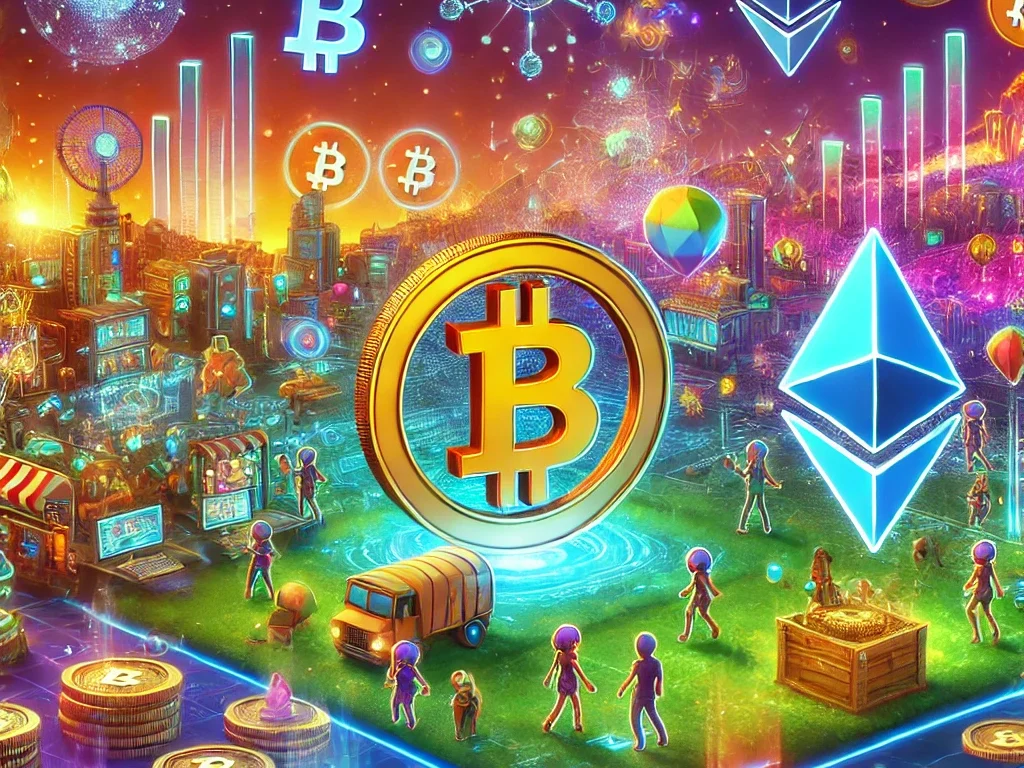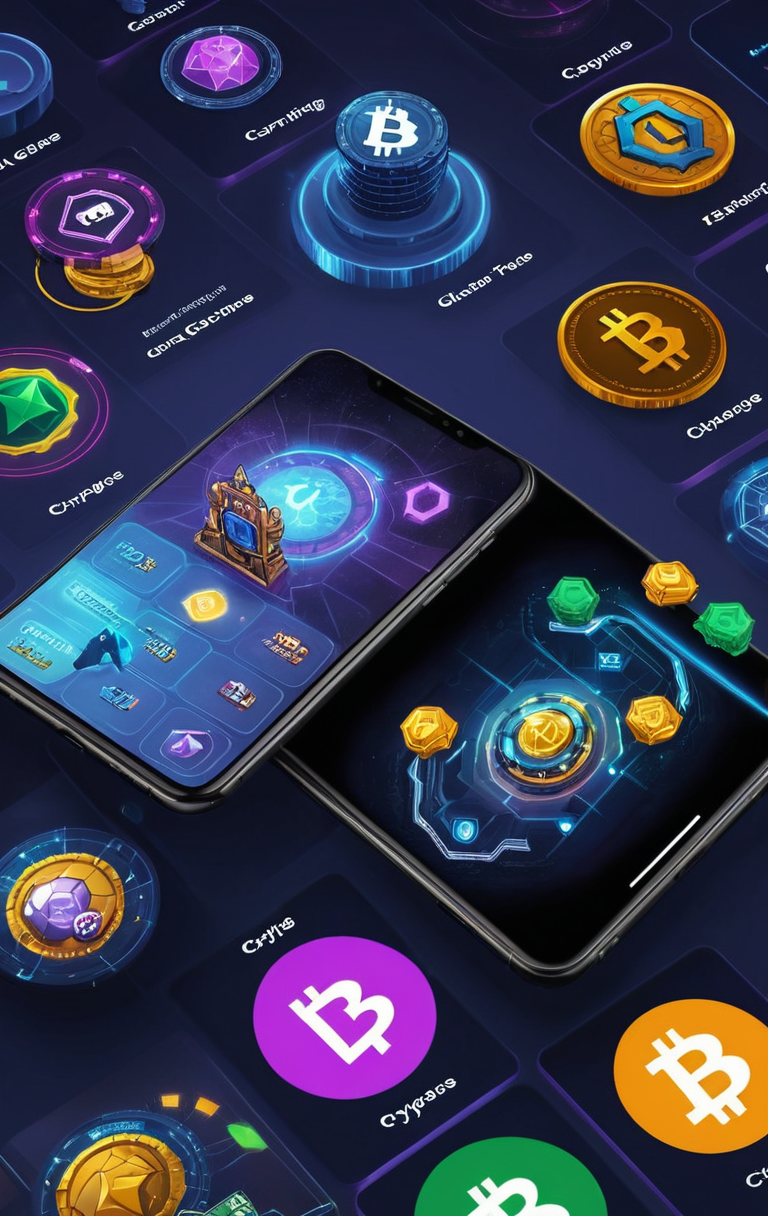Hi, gamers and crypto enthusiasts, and welcome to the world of crypto games. Maybe you’ve heard of them and heard people tell you they’re the next big thing. But what exactly is a crypto game? How does it work, and why should you care?
Crypto games are changing the way people engage with games, earn money and think about the world. In this article, we’ll take a look at what a crypto game is, how it works, and why it’s becoming the next big thing for players around the world.
What is a Crypto Game?
A crypto game is a video game that has in-game assets, such as characters, spaceships, weapons, etc, that can be earned, traded and owned as cryptocurrencies or non-fungible tokens (NFTs) through the blockchain. The classic pitfall of video games is that players are encouraged to invest their time and money into a game, and they never truly gain ownership over what they earn. Crypto games are aiming to change that by giving players a tangible asset that they can buy, sell or trade in the real world.

Key Features of Crypto Games
- Play-to-Earn Model: Many crypto games operate on a play-to-earn model, where players can earn cryptocurrency or NFTs by completing tasks, winning battles, or participating in the game’s economy. This model incentivizes players to engage more deeply with the game.
- Ownership of Assets: In crypto games, players truly own their in-game assets. Whether it’s a rare character, weapon, or virtual land, these assets are stored on the blockchain, giving players the ability to trade or sell them outside the game.
- Decentralization: Many crypto games are built on decentralized platforms, meaning they are not controlled by a single entity. This decentralization fosters a community-driven environment where players have a say in the game’s development and economy.
- Interoperability: Some crypto games allow assets to be used across different games or platforms, enhancing their value and utility. This interoperability is a game-changer for players looking to maximize their investments.
How Do Crypto Games Work?
Crypto games typically operate on blockchain networks, with Ethereum being one of the most popular platforms for developing these games. Here’s a simplified breakdown of how they work:
- Blockchain Technology: Crypto games use blockchain to record transactions and ownership of in-game assets. This ensures transparency and security, as all transactions are publicly verifiable.
- Smart Contracts: Many crypto games utilize smart contracts, which are self-executing contracts with the terms of the agreement directly written into code. These contracts automate processes like asset transfers and rewards distribution.
- In-Game Economy: Players can earn cryptocurrency by participating in various activities within the game, such as completing quests, battling other players, or trading assets. The in-game economy often mirrors real-world economic principles, with supply and demand influencing asset values.
Popular Crypto Games
1. Axie Infinity
Axie Infinity is one of the most well-known crypto games, where players breed, raise, and battle fantasy creatures called Axies. Players can earn tokens by winning battles and completing quests, and they can trade their Axies as NFTs.
2. Decentraland
Decentraland is a virtual reality platform where players can buy, sell, and build on virtual land. Users can create experiences, games, and applications, all while earning cryptocurrency through their creations.
3. The Sandbox
The Sandbox allows players to create, own, and monetize their gaming experiences. Users can build their own games and assets, which can be traded as NFTs, creating a vibrant ecosystem of user-generated content.
Are Crypto Games Gambling?

Crypto games can fall into the category of gambling depending on their structure. Many crypto games involve chance-based mechanics, such as loot boxes or randomized rewards, which may resemble gambling. In some games, players wager their cryptocurrency or assets in the hope of winning rewards. When games involve this element of risk and reward, they might be regulated as gambling in certain regions, similar to online casinos or betting platforms.
However, not all crypto games are considered gambling. Some focus on skill-based challenges where players earn rewards based on their performance rather than chance. In these cases, players’ success relies on their strategy or gameplay skills, making the game less about gambling and more about skill.
Why Are Crypto Games Gaining Popularity?
1. Earning Potential
The ability to earn real money while playing games is a significant draw for many players. The play-to-earn model allows gamers to monetize their skills and time, making gaming a viable source of income.
2. True Ownership
Crypto games provide players with actual ownership of their in-game assets. This contrasts sharply with traditional games, where players have no control over their purchases once the game is discontinued or the servers are shut down.
3. Community Engagement
Many crypto games foster strong communities where players can collaborate, compete, and share experiences. This sense of belonging enhances the gaming experience and encourages players to invest more time and resources.
Do Crypto Games Make Money?
Yes, many crypto games make money. Here’s how they typically do it:
- In-Game Purchases and NFTs: Many crypto games allow players to buy in-game assets, such as characters, skins, or items, often represented as NFTs (non-fungible tokens). These purchases generate revenue for game developers.
- Tokenized Economies: Some crypto games have their own in-game tokens or currencies, which players need to buy with real money or crypto. These tokens are used for trading, upgrades, or access to certain features, bringing in revenue.
- Transaction Fees: In games with player-driven economies, developers often charge transaction fees on in-game marketplaces. Every time a player buys, sells, or trades assets, the game’s creators earn a small fee.
- Play-to-Earn Models: Certain crypto games use a “play-to-earn” model, where players earn cryptocurrency as they play. Developers make money by attracting players who invest in the game economy, buying tokens or in-game assets.
Challenges and Considerations
While crypto games offer exciting opportunities, they also come with challenges:
- Market Volatility: The value of in-game assets can fluctuate dramatically, impacting players’ investments and earnings.
- Regulatory Concerns: As the crypto space evolves, regulatory scrutiny may increase, potentially affecting the operation of crypto games.
- Technical Barriers: Some players may find it challenging to navigate the technical aspects of blockchain and cryptocurrency, which could deter them from participating.
Conclusion
Crypto games are transforming the gaming landscape by merging entertainment with the potential for real-world earnings. With their unique features, such as true ownership of assets and play-to-earn models, these games are attracting a diverse audience of players and investors alike. Whether you’re a seasoned gamer or new to the world of crypto, exploring crypto games can open up exciting opportunities. So, gear up, dive in, and see what this innovative gaming frontier has to offer! Happy gaming!

